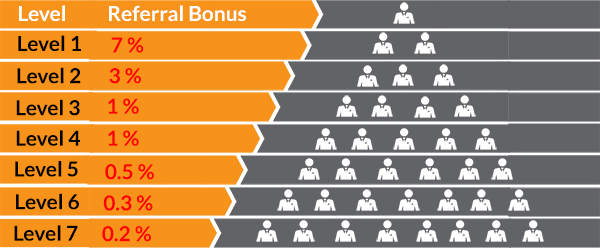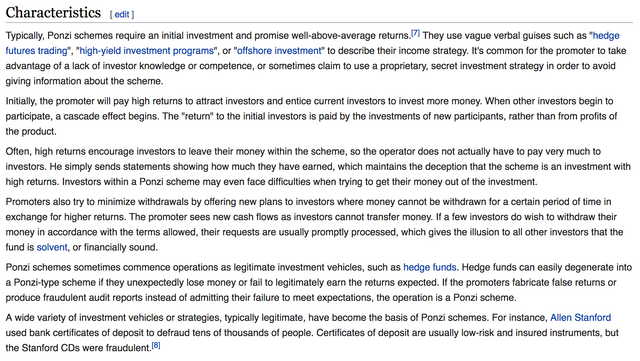RE: taking flags like man
Are you suggesting that only people who have invested money into a scam are the ones who can call it a scam? Using your line of reasoning, people who consider it a scam and choose not to invest shouldn't speak up about what they deem a scam.
And while we're on the topic, Bitconnect literally is a pyramid scheme. This graphic is from their website. 
Note the shape of the graphic. Those who invested early received the highest rewards for bringing more people on board. They profited off people "below" them in the pyramid investing their money. And the pyramid scheme fell apart when there wasn't enough money to pay those at the top of the pyramid. Here's Wikipedia's description for what a Ponzi scheme looks like: 
(Source: https://en.wikipedia.org/wiki/Ponzi_scheme)
Let's see the similarities between a typical Ponzi and Bitconnect.
- "Ponzi schemes require an initial investment and promise well-above-average returns." –– This was required of Bitconnect. A daily return of 1% is incredibly high.
- "They use vague verbal guises such as "hedge futures trading", "high-yield investment programs", or "offshore investment" to describe their income strategy." –– Bitconnect mentioned the trading bot. It also described itself as a lending platform. It gave off the image that it's a legitimate investing platform.
- "It's common for the promoter to take advantage of a lack of investor knowledge or competence, or sometimes claim to use a proprietary, secret investment strategy in order to avoid giving information about the scheme." –– The proprietary investment strategy in question here is BCC's trading bot. Did an actual bot exist? No one except the people who ran BCC knows. Hint: something tells me they didn't.
- "Initially, the promoter will pay high returns to attract investors and entice current investors to invest more money. When other investors begin to participate, a cascade effect begins." –– 7% returns are crazy for Level 1 BCC investors. It seems to good to be true (because, well, it is).
- "The "return" to the initial investors is paid by the investments of new participants, rather than from profits of the product." –– This is what happened, but some Bitconnect investors refuse to believe it because then they would have concede that they invested in a pyramid scheme.
- "Often, high returns encourage investors to leave their money within the scheme, so the operator does not actually have to pay very much to investors." –– Bitconnect had you leave your funds on the lending platform for x number of days.
- "He simply sends statements showing how much they have earned, which maintains the deception that the scheme is an investment with high returns. Investors within a Ponzi scheme may even face difficulties when trying to get their money out of the investment." –– Bitconnect showed how much money you had "earned." Seeing all this money would entice you to keep your money on the lending platform. Moreover, as I said above, Bitconnect held on to your investment for x number of days, thereby making it difficult for you to take your money out of the lending platform.
- "Promoters also try to minimize withdrawals by offering new plans to investors where money cannot be withdrawn for a certain period of time in exchange for higher returns." Again, see above. Bitconnect held onto your funds for, at a minimum, 90 days, if I'm not mistaken.
Bitconnect had many characteristics of both a Ponzi scheme and a pyramid scheme. It baffles me that people didn't see it. And I'm certain that people like Craig Grant, Trevon James, and CryptoNick (among others) knew about this. Let's assume that they didn't know from the very beginning that Bitconnect was a scam. After waves upon waves of people comment on their videos telling them that Bitconnect is a scam, would they not look into whether they're invested in a scam? There's a lot of literature on the Internet explaining why Bitconnect was/is a scam. The likelihood that these big-name Bitconnect investors unknowingly promoted what is undoubtedly a Ponzi/pyramid scheme is zero.
And while the promoters don't deserve all of the blame, as the investors they drew in should've done more research, they do deserve legal action taken against them as they knowingly promoted a scam. Yes, we should certainly go for the people who created Bitconnect (if I'm not mistaken there are several class-action lawsuits against Bitconnect), but that doesn't mean that the people who knowingly promoted it are absolved of their sins.
And, no, I never invested in Bitconnect but I'm vocal about how it's a scam because I've done my research. I can still speak up about it without having invested money into it. After all, if I think something is a scam, why would I put my money into it?
Everyone is allowed to have an opinion. But choosing to express that opinion by spamming the hell out of someone's page is ridiculous (to me).
Especially when you didn't even invest personally. Now if Craig mislead you and you are upset and you came to his page to express that I would understand.. - but many seem to be just jumping on the bandwagon.
To act like you hate this man and want him to die BUT come to his page to spam every post - It's Insane man
There are even people in these comments who said THEY KNEW IT WAS A SCAM , MADE MONEY BUT STILL blame @craig-grant .
I just wish we could all express our opinions and get this fired up about some positive things lol.